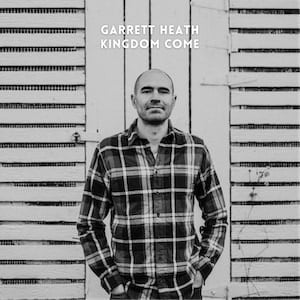
Garrett Heath – Kingdom Come
Independent – 30 July 2021
Born, raised and still resident in rural Pennsylvania, Kingdom Come is Garrett Heath’s second album, his first in seven years. It was recorded live off the floor and written in response to a series of difficult life situations and the strength and support of family and friends that kept him afloat.
Musically, he sits firmly in the strummed acoustic guitar tradition of names like Springsteen, Prine, Young and Dylan. The album opens with the sparsely melodic, harmonica haunted You’ll Find Me, a song about opening your eyes and mind to the goodness and beauty that surrounds you if you only look (“You’ll find me, in the hills and forests/Oh you’ll find me in the fields/You’ll find me, in a child’s laughter/Oh you’ll find me, in all that’s real”).
A similar sentiment informs the Dylanesque and similarly musically accompanied title track, as he sings, “We’re all digging for love in all this hurt/Looking for sun in the pouring rain/Looking for hope in all this pain”, a song that seems to have been born from the recent turbulence of the American socio-political landscape. As such, it’s suitably followed by the sparsely strummed, banjo-tinged Rise Up From Your Sleep, a Prine-like call to awakening to who you are and who you can be (“Young girl goes against a teacher’s will/‘Cuz she can’t do math, and she can’t sit still/And she’s only alive when she’s on her feet/And the song’s as strong as the air she breathes”).
Taken at a lurching walking beat and again coloured by harmonica, The Feast is a call for coming together in the name of love, not hate (“War is a courageous fight/But only love puts the fear in your enemy’s eyes/Leave your guns at the door, you don’t need ‘em no more”) and which is the first to touch on the religious aspect implied by the album title as it speaks of salvation and healing with “Let our love be an offering/As we give up ourselves to the King of all kings/Just come through the door and you’ll be restored”.
As such, it continues to build on that imagery with the slow-paced When God Had A Son (“the world was dark and dim/He told us the world would hate us like it hated him/God had a son without sin/But God never had a son without suffering”), though it’s clear the commentary extends beyond reciting the Biblical account of the crucifixion.
Harmonica returning and the pace picking up slightly with a melody strikingly akin to Dobie Gray’s If You Could See Me Now, Leaving is about finally making a needed change in the search for a better world “Where dreams come true and we won’t, cry no more/Where we can believe again and trust once more”.
It’s followed by two numbers based around the theme of mercy. First, the banjo-flecked, Prine-styled slow march ballad Wait for Mercy (“I got these hands, can’t hold onto nothing/I got these feet, can’t walk the line/So I’ll be still, and wait for mercy/I pray that grace will soon be mine”) and then, taking a more specific divine perspective with the same musical feel, the mortality-rebirth of River of Life (“I bid you goodbye/Fall hard on the mercy of God/Rest easy in the arms of his love”) with its call to the greedy, the cowards, the drunkards, the prisoners, and all the broken and all the unworthy come to find “drink from the river of life”. It ends with Epilogue: A Light, a finding of peace beyond the sorrows and pain, and a message about the common humanity “hidden deep inside you and me” that will surely lead us home. Cast in the mould of 60s Greenwich village troubadours, a simple album of simple but infectious folksy melodies and songs about truth, faith, hope, pain and salvation, played in a simple, unfussy style and sung in a dusty, world-weary voice, this is a quiet, simple joy.
Website: https://garrettheathofficial.com/
Photo credit: Oakwood Photography

